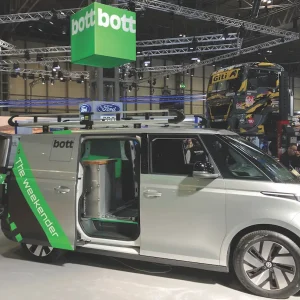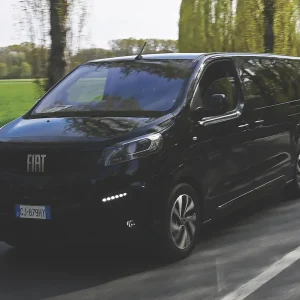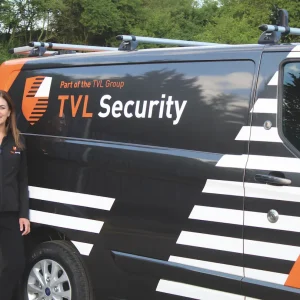 Earlier this year Smith Electric Vehicles unveiled a battery-powered version of the Ford Transit under the Edison banner. The environmentally friendly van is set to be acquired by supermarket giant Sainsbury and Scottish & Southern Energy among others. Smith has also launched an electric 7.5- to 12-tonner called the Newton, now in service with DHL and TNT using a cab sourced from Avia. Orders appear to be flowing in, so how many electric vehicles are you producing annually at your UK plant?
Earlier this year Smith Electric Vehicles unveiled a battery-powered version of the Ford Transit under the Edison banner. The environmentally friendly van is set to be acquired by supermarket giant Sainsbury and Scottish & Southern Energy among others. Smith has also launched an electric 7.5- to 12-tonner called the Newton, now in service with DHL and TNT using a cab sourced from Avia. Orders appear to be flowing in, so how many electric vehicles are you producing annually at your UK plant?
We'll build approximately 500 Edisons and Newtons this year. On top of that we're also continuing to make our battery-powered industrial vehicles and we'll probably turn out around 500 of those too.
To what extent do you expect production to rise in future bearing in mind the rapidly growing interest in zero-emission vans and trucks?
That's a hard one to call. If you'd asked me that question six months ago, I would probably have said that we'd like to get to 3,000 to 5,000 units annually. Now, I really don't know; but potentially more than that. We've already had a number of major light commercial operators tell us that electric vans could in future make up 10 per cent of their fleet given the nature of the work they're on. Some have suggested that the total could rise as high as 25 to 30 per cent. Remember that a lot of operators on urban delivery work don't do high mileages, so electric vehicles are ideal for their needs. For example, one of our Newtons in service with an operator in London is doing no more than 30 miles daily.
Under those circumstances the restricted range of battery-powered chassis isn't a big issue. But what is the maximum range that can be achieved before the batteries go flat?
We're using sodium nickel chloride batteries and an empty Edison fitted with them has travelled for just over 100 miles under test conditions before they needed recharging. In the real world you should be able to get 60 to 100 miles, but a lot will depend on how much weight you are carrying and how many batteries you had fitted.
How soon before we see improvements in battery technology?
I think the next four years will see some dramatic developments. We'll see an advance within the next 12 months, but the real jump forward will come three years afterwards.
 How confident are you that these technological improvements will actually occur?
How confident are you that these technological improvements will actually occur?
In the past there wasn't the environmental focus that there is now. This increased focus has prompted companies that have developed lithium ion batteries for mobile phones and laptops, for example, to take a keener interest in what's happening with vehicles. While sodium nickel batteries are probably at their zenith, lithium ion batteries are very much in their infancy. As a consequence we'll soon be getting a lithium ion battery, at a slight premium to the sodium nickel equivalent. It will offer the same performance but will probably last longer and will certainly be a lot easier to package. The batteries we use at present are housed in a box or two boxes and have to be placed on their sides or on their ends. By contrast, you can mould a package of lithium ion cells into a bulkhead. They don't take up so much space.
Will that make it easier to produce, say, an electric Ford Transit Connect in the future?
It could do.
How much do your present batteries and the related ancillary equipment weigh?
You'll suffer a payload penalty, but a van like the Edison we have supplied to the Royal Mail will still carry 1,200kg.
Is payload capacity likely to increase with the advent of new battery technology? In future a given size of battery is likely to generate more energy than today's offerings so you'll be able to use a lighter one than you do now to travel a given distance.
It will increase for customers who do lower mileages, but I think that those who do more miles will stay with the existing weight penalty in order to enjoy a longer range. For a lot of operators power output is more important than payload. If they can get a 1,000kg payload out of an electric 3.5-tonner then they're happy, and they can always go to 4.25 tonnes if they need to carry more. Remember that a parcel delivery company will typically only be transporting around 800kg at a time.
Go to 4.25 tonnes, then thanks to a recent regulatory change you'll be exempt from heavy truck-style tachograph and operator's licence requirements just so long as you travel no more than 50km from home base. Electrics previously qualified for an exemption that involved no mileage restriction at all, and the new restriction may reflect government realisation that they're becoming more popular. So how soon before lighter batteries appear?
I reckon it will be about two to three years before we see a significant improvement in kilometres per kilo.
 How long does it take to charge up the batteries used today?
How long does it take to charge up the batteries used today?
We've now got a battery that allows you to put in 50 per cent of the power in just 45 minutes. That means that if your van has a realistic working range of 60 miles, the driver can do 30 miles in the morning, put it on charge at lunchtime, then do a further 60 miles in the afternoon. Recharging batteries when they're completely flat takes about eight hours and you can do it using a standard domestic supply. If the vehicle is fitted with three batteries or more, however, you'll need three-phase. You can either buy or lease the batteries by the way, but to date all the customers we've sold vehicles to have bought them; and they're 100 per cent recyclable.
What impact does running air conditioning, satellite navigation and other ancillary features that draw power have on an electric van's range?
Air con has a significant impact and will probably drop your range by from 10 to 15 miles. The other items don't to any great extent.
You quote a top speed of 50mph for the Edison which is more than enough for the city centre work it will usually be employed on. But how durable are your vehicles?
They'll last a lot longer than the five years or so it takes before you see a return on your investment in the Edison. An Edison will not wear out in the way a conventional van does. There's no turbocharger or head gasket to blow, and no clutch or gearbox to worry about. It uses regenerative braking, so your brake wear is minimal.
Does it worry you that if electric vans become more popular, the government will react by ending the zero vehicle excise duty concession?
I find it difficult to believe that it would try to hinder their development, and it certainly shouldn't. In fact it should be doing more to support them bearing in mind that electric vehicles attract no grants to encourage their use whatsoever. By contrast, in certain states in the USA you can obtain a grant equivalent to 80 per cent of the premium you pay over and above the cost of acquiring a conventionally powered vehicle. As a consequence the increased use of electric vans in the UK is being hampered by their high capital cost; three times that of a conventionally-powered van.
Surely that makes them completely uneconomic for most businesses?
Remember that as well as enjoying low maintenance costs, zero excise duty and exemption from the London congestion charge, the cost of powering an Edison equates to around just 3.5p a mile. That's a lot cheaper than running on diesel.
Do you plan to sell electric vehicles in the USA?
We'll be manufacturing them there from the last quarter of this year onwards with the aim of supplying them to customers in North, South and Central America. Exports to Europe will be handled by our UK plant. The Newton will be built in the USA. We'll have a smaller vehicle too, but it won't be based on Transit.
Whose idea was it to introduce an electric Transit? Yours or Ford's?
Ours, we approached them. They said if we ordered 100 Transits for conversion, then they'd take us seriously. So that's what we did.
What do you do with the diesel engines and so on once you've stripped them out?
We crate them up and sell them to a UK firm that takes most of the components we remove.
What are you doing about aftersales support?
We've got 20 depots nationwide.
Why aren't you offering a diesel/electric hybrid?
Our niche is pure electric and always has been, and that's what differentiates us from a lot of other people. We don't want to confuse the issue given that the major mainstream vehicle manufacturers are getting into hybrids anyway. Customers have in fact from time to time asked us to add a small generator just to extend the range a little; but if we did that we wouldn't be zero-emission.

 Earlier this year Smith Electric Vehicles unveiled a battery-powered version of the Ford Transit under the Edison banner. The environmentally friendly van is set to be acquired by supermarket giant Sainsbury and Scottish & Southern Energy among others. Smith has also launched an electric 7.5- to 12-tonner called the Newton, now in service with DHL and TNT using a cab sourced from Avia. Orders appear to be flowing in, so how many electric vehicles are you producing annually at your UK plant?
Earlier this year Smith Electric Vehicles unveiled a battery-powered version of the Ford Transit under the Edison banner. The environmentally friendly van is set to be acquired by supermarket giant Sainsbury and Scottish & Southern Energy among others. Smith has also launched an electric 7.5- to 12-tonner called the Newton, now in service with DHL and TNT using a cab sourced from Avia. Orders appear to be flowing in, so how many electric vehicles are you producing annually at your UK plant?



